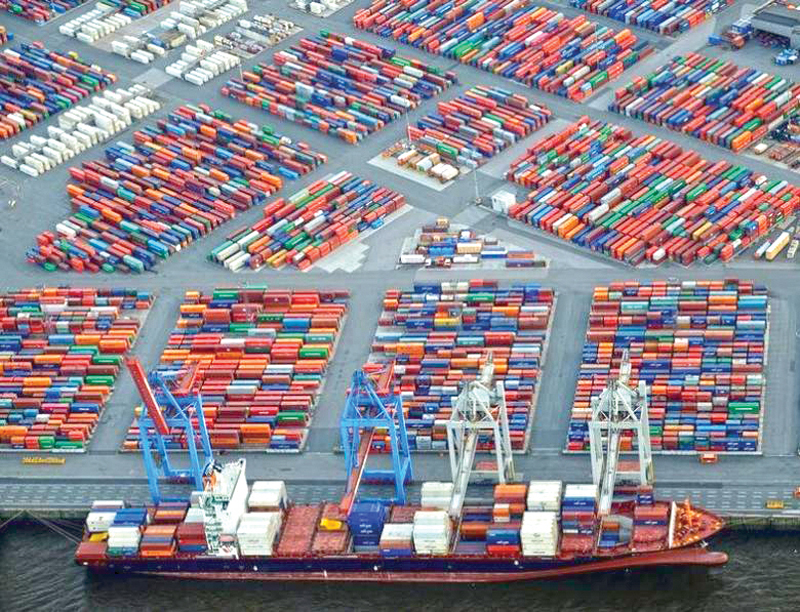
As the government moves towards the end of its tenure, there should be independent performance audit of each of these ministries based on the promises made in the PML-N economic manifesto.
Export issue
One of the biggest challenges for Prime Minister Nawaz Sharif and his economic team was to reverse the historic decline in the country’s exports, which has registered a decline of 17% since 2014. The diagnosis was that exports declined primarily because of a shrinking manufacturing base underpinned by a major electricity crisis.
This diagnosis, right or wrong, shifted the government’s focus away from core institutional issues faced by the trade and investment climate of the country towards one goal – production of surplus electricity.
Gender, work and society: ‘Women must play role in economy’
In the meantime, the agencies responsible for trade expansion and investment promotion kept pursuing their isolated strategies, largely ineffective, thus denying any opportunity to drastically re-think how the economic governance should really be planned.
There is good news; the exports situation is a crisis, which is likely to precipitate a significant balance of payment deficit. I consider it as a positive because hardly anything else moves our imagination and drive.
Two recent pieces of news point out that the commerce minister also feels the heat of the crisis. One is the appointment of a new commerce secretary, who was just transferred from the Ministry of Water & Power. Second, the federal commerce minister had hesitantly approved additional allowances for the commerce ministry staff as an incentive to help boost exports by using the Export Development Fund.
Both of these news items suggest that the government is not only running out of export earnings but is also running out of sound ideas on how economic governance needs to be fixed to help boost trade.
The expectation that one competent secretary or a few able civil servants can arrest declining exports is naivety at best. Commerce Secretary Younus Dagha has already been sent to another ministry, a norm in the civil service of Pakistan.
Drawing parallels
In comparison, Malaysia’s Ministry of International Trade and Investment (MITI) is a great example. It is not possible to transfer any officer out from this ministry, which overtime helps in developing a hugely talented and knowledgeable workforce.
The top officer, usually a secretary general, enjoys autonomy vis-à-vis political intervention. With this assured hands-off approach, Malaysia’s MITI has done wonders for the country’s trade and investment portfolios.
Malnutrition causes loss to economy
The exports from Malaysia, a country with almost one-seventh of Pakistan’s population, have touched the $200 billion-mark. The biggest lesson we can learn from this example is how a government agency actually facilitates in expanding trade and investment opportunities by investing in its own systems.
It is not to suggest that Pakistan can become the next Asian tiger by doing the same. It is improbable to suggest the East Asian way for Pakistan due to a number of political, cultural and geographic factors.
However, one pertinent lesson amongst many is the exact role played by the government in this economic transformation, which led to substantial economic and social gains. Forty years ago, the poverty rate of Malaysia was 50%; now it is 0.6%.
One common factor in these countries was how trade and investment agencies effectively coordinated. This was most visible in the case of Korea Trade-Investment Promotion Agency (KOTRA) and MITI in Malaysia.
In Malaysia, the equivalent of our Trade Development Authority of Pakistan (TDAP) is MATRADE, which was created in 1993. MATRADE works under MITI and its mission is to develop and promote Malaysia’s exports” to the world.
Today, however, MATRADE has a total of 518 employees and 39 foreign offices on six continents. Each office is headed by a Trade Commissioner who enjoys ambassadorial status. MATRADE’s headquarters in Kuala Lumpur house a large library and resource centre that provides access to 14 databases, including a number that are provided on a “subscription only” basis; a small fee is charged for using these data bases.
The prime minister should immediately consider bringing BoI under the commerce ministry and should let the two agencies work in close harmony like many other countries have done.
the writer is Founder of PRIME Institute, an independent think tank based in Islamabad and now based out of Kuala Lumpur.
Published in The Express Tribune, May 29th, 2017.
Like Business on Facebook, follow @TribuneBiz on Twitter to stay informed and join in the conversation.




1730464033-0/BeFunky-collage-(12)1730464033-0-165x106.webp)












COMMENTS
Comments are moderated and generally will be posted if they are on-topic and not abusive.
For more information, please see our Comments FAQ